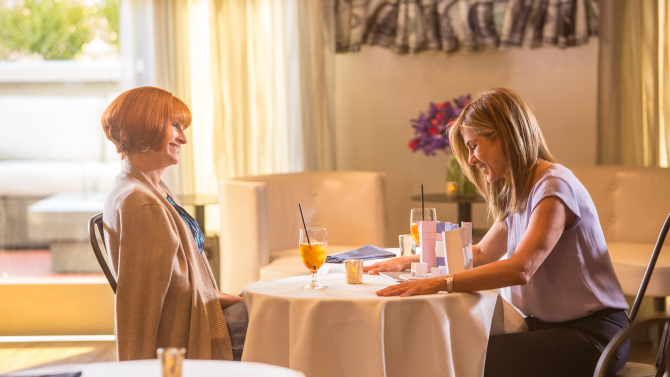“I put on my bra for this?” says a bemused, Hawaiian-shirt-clad Margo Martindale in Mother’s Day. Her character, a xenophobe named Flo, surprise visits her grown-up children, only to find out her daughter Jesse (Kate Hudson) is married to an Indian (the horror!) and her daughter Gabi (Sarah Chalke) is married to a woman (double horror!).
This is not a film from or set in the 1990s, or even 10 years ago. The only explanation is that it’s a Garry Marshall vehicle, the latest in his commercially calculated and insipidly unfunny holiday movie franchise (which also includes New Year’s Eve and Valentine’s Day). Flo’s rhetorical question about her sartorial efforts resonated with me: I put on a bra to watch this?
Mother’s Day is centred around the holiday in order to superficially interconnect story lines about What It Means to Be a (White) Mom, Today. There’s Flo’s daughter Jesse (Kate Hudson), who’s been lying to her estranged parents and her husband Russell (Aasif Mandvi).
There’s Jesse’s friend, Kristin (Britt Robertson), who musters up the courage to meet her biological mother, Miranda (Julia Roberts), a ubiquitous celebrity shopping network host who offers the cliche portrait of a childless career woman rediscovering motherhood.
Miranda has an interior designer named Sandy (Jennifer Aniston), a divorced mom who copes with her ex-husband Henry’s (Timothy Olyphant) new, young, attractive wife (Shay Mitchell). Sandy has several embarrassing meet-cutes with a stranger named Bradley (Jason Sudeikis), an emotionally unintelligent widower struggling to raise his two daughters alone.
Did I miss anyone? Probably, because everybody and their mother is in Mother’s Day. The film is so labyrinthine it’s scattershot — introducing new characters only to forget about them until it’s convenient to revisit — which renders the film entirely forgettable.
As if Marshall is aware of this, he inserts moments of whimsy to perk us up: Bradley wears pink pants, Gabi and her partner make a large pink womb for the mother’s day parade, a party clown offers Sandy some sage platitudes about life, or something (the wisdom is not as important as the fact that it’s from a clown).
Mother’s Day is the kind of film that thinks it’s progressive in acknowledging racism and homophobia, yet casts a couple of token actors of colour in minor roles. It’s the kind of film that supposedly offers a cross-section of motherly experiences, yet doesn’t account for women who, for example, aren’t white, who can’t have or who don’t want children.
But depending on your sense of humour and/or lack of standards, Mother’s Day’s problems are relatively unimportant. A certain demographic will flock to this film because they’re largely ignored by Hollywood and have no other option: women. These are consumers who don’t find themselves reflected in the cinema wasteland of superhero films, who have largely turned to television to find relatable (read: female) characters, and who still want to enjoy a girl’s night out at the theatres.
It’s slim pickings, so why not throw on a bra and watch Mother’s Day? You’ll probably forget it all by tomorrow, anyway.

